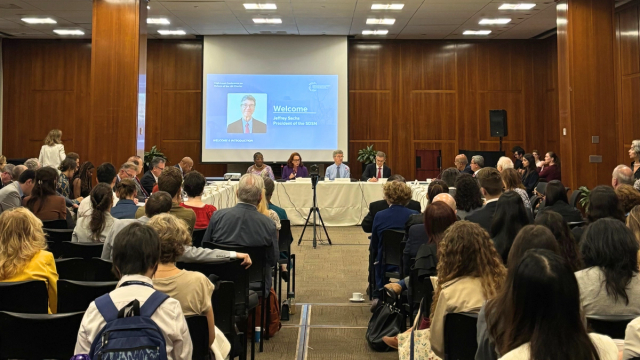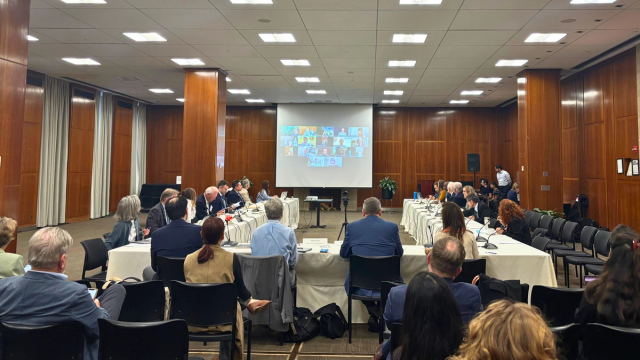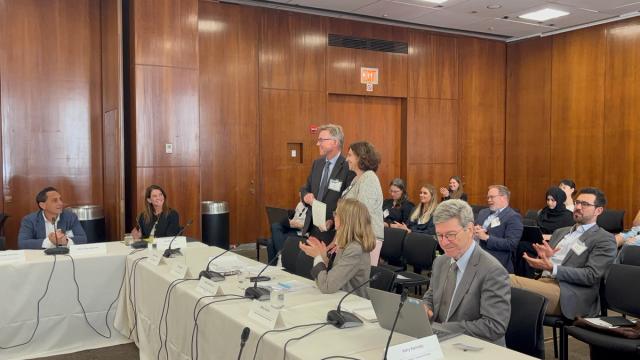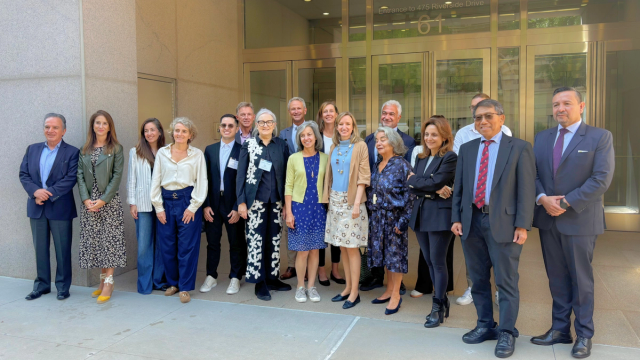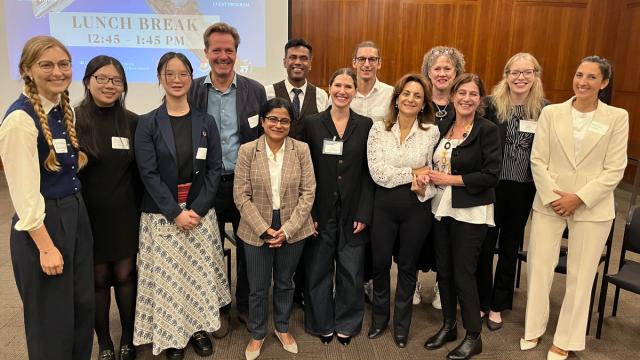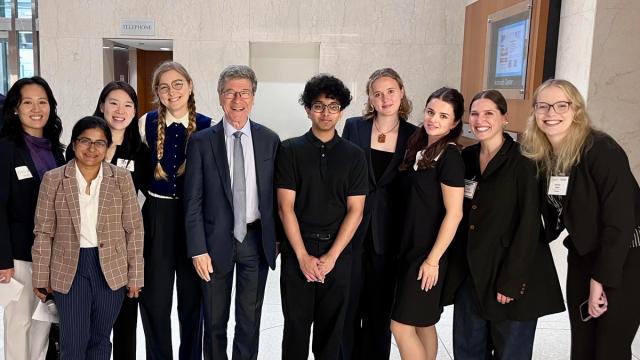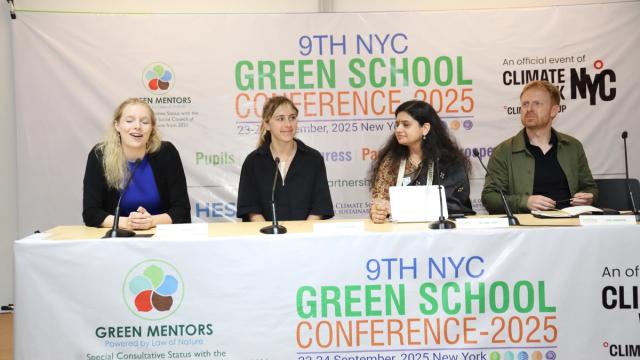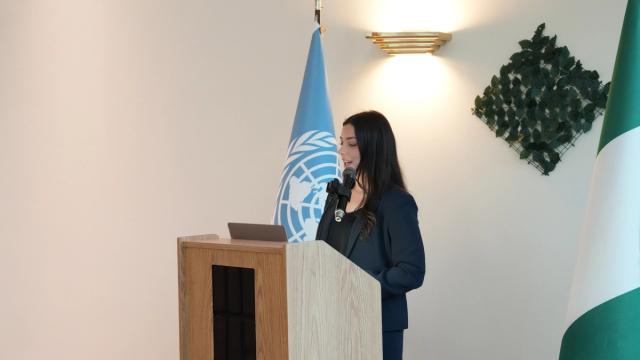SDSN Advances Key Themes at UNGA80 and Climate Week NYC
From September 9 to 29, 2025, world leaders, policymakers, and sustainability advocates gathered in New York City for the 80th United Nations General Assembly (UNGA 80) and Climate Week NYC. The spotlight was on urgent global challenges, from escalating geopolitical tensions to the accelerating climate crisis.
Against this backdrop, the UN Sustainable Development Solutions Network (SDSN) convened and participated in a series of high-impact events designed to advance bold, knowledge-driven solutions. These gatherings aimed not only to address immediate global challenges but also to rethink and strengthen the systems needed for peace, sustainability, and equitable development in the decades ahead.
Reforming Global Governance
On September 17, the SDSN hosted a high-level Conference on Reform of the UN Charter, bringing together global leaders for a day of dialogue and strategic brainstorming. Building on the 2024 Summit of the Future, the conference revisited a Charter last amended over 50 years ago, in 1973, making renewed discussions and a recommitment to strengthening faith in global governance particularly timely.
High-level participants, including former UN General Assembly Presidents H.E. María Fernanda Espinosa and H.E. Vuk Jeremić, engaged in sessions covering critical topics such as amplifying the voices of underrepresented regions, assessing the implications of veto powers, evaluating financial mechanisms for sustainable development, and examining the potential relevance of Article 109 of the UN Charter.
The conference underscored the urgent challenge ahead: translating these discussions into actionable reforms that can meet the demands of the 21st century.
Mobilizing Networks for Local & Global Impact
SDSN Networks Chairs Meeting
On September 18, SDSN Network Chairs gathered in New York City for the fourth annual convening of Network Chairs, highlighting the robust efforts and innovative solutions led by Networks worldwide to advance sustainable development, particularly in urban contexts. The event brought together 15 Network Chairs in person and nearly 40 online, representing SDSN’s 59 National and Regional Networks.
The day-long session featured dialogues and presentations from leaders across Africa, the Americas, Asia-Pacific, Europe, and the Middle East. Network Chairs also discussed shaping the post-2030 narrative, advocating for the extension of the SDGs beyond 2030 with greater ambition, stronger commitments, and enhanced resources.
SDSN Leadership Council Meeting
The next day, on September 19, the SDSN hosted its 25th Meeting of the SDSN Leadership Council, a high-level advisory group of more than 95 eminent figures from academia, business, civil society, and government that shapes the network’s strategic direction. Gathering in New York City and online, the Council addressed critical issues including financing sustainable development, evolving trade systems, accelerating the energy transition, and advancing equitable education.
During the meeting, the SDSN also announced the winning project of the 4th edition of the Universities for Goal 13 competition: "Turning algae into the future of clean industry.” The winners, students from Monash University, were awarded $10,000 (USD) to support implementation and will return to New York in 2026 to showcase their progress.
Education for Sustainable Development
Education for Peace and Planet: From Histories to Futures
On September 22, the SDSN, Columbia University’s Center for Sustainable Development, Mission 4.7, SDGs Today, and the Global Schools Program hosted a full-day hybrid event exploring how education can advance peace, resilience, and sustainability. Anchored in the Ages of Globalization learning journey, the event connected history to action, showing how geography, technology, and institutions shape today’s choices. Discussions emphasized pairing local projects with global systems thinking, supporting teacher well-being, and giving youth meaningful roles in decision-making.
The event showcased Schools for Goal 7, a Global Schools and Siemens Energy initiative that integrates renewable energy and sustainability into classrooms through gamified curricula such as Planet Rescuers. Teachers from around the world shared experiences, discussed scaling the program, and highlighted ways to engage students in energy and sustainability projects locally and globally.
The day also introduced the Ages of Globalization Higher Education Track, a self-paced course with weekly live sessions led by Professor Jeffrey D. Sachs from February to April 2026. The track is designed to help universities translate learning into actionable campus and community initiatives, equipping students and educators with the skills to advance sustainability in tangible ways.
9th NYC Green Schools Conference
SDSN supports educators at all levels, offering K–12 resources through the Global Schools Program, secondary programs through Ages of Globalization, and professional and university courses through the SDG Academy. Building on this commitment to advancing education, the SDSN participated in two panels at the 9th Annual NYC Green Schools Conference, hosted by Green Mentors.
The first session, “Advancing SDG Integration in Teaching, Learning & Assessment,” featured Amanda Abrom, Director of the Global Schools Program; Helen Perham, SDG Academy Communications Coordinator; Dr. Jinal Joshi, Director of International Relations at Kadi Sarva Vishwavidyalaya University, India; and Paul Johnston, Founder of Governance for Good. Panelists shared insights on integrating education for sustainable development across students’ learning journeys.
The second session, “Learning from the Ages of Globalization – From the First Societies to Green Classrooms,” included Katja Anger-Delimi, Education Specialist, SDSN; Haein Shin, Education Adviser, Columbia University; and Prof. Poonam Kumria, Principal, Indraprastha College for Women, University of Delhi. Panelists explored how indigenous knowledge, historical wisdom, and cultural literacy can enrich contemporary sustainability education. Drawing lessons from the Ages of Globalization and UN at Your Doorstep, they discussed strategies for embedding environmental awareness across disciplines while inspiring students to become planetary stewards grounded in their heritage.
Youth Engagement and Leadership
As part of UNGA, SDSN Youth participated in the UN Youth Office’s #YouthLead Festival, a global series of events celebrating youth action, promoting intergenerational collaboration, and showcasing local solutions to shared global challenges.
The session “Shaping Policy Across Generations: Youth at the Heart of Global Decision-Making,” co-hosted by SDSN Youth and the SDGs Secretariat of the Office of the Prime Minister of Uganda, highlighted the vital role of young people in shaping policy. With nearly half of the world’s population under 30, speakers shared strategies to engage youth meaningfully in policymaking, ensuring they hold institutionalized roles beyond symbolic participation. Recommendations included empowering local youth councils, enabling participation in global negotiations, and embedding youth leadership in governance structures.
SDSN Youth Global Coordinator Raquel Armendariz and SDG Academy Head of Education and Training Shannon Kobran also joined Junior Chamber International’s Global Youth Dialogue. In the “Impact Where It Matters” segment, Armendariz emphasized the importance of building knowledge, skills, and strong communities to drive long-term change, while Kobran advocated for lifelong learning and adaptability, stressing that while technology is a tool, soft skills such as critical thinking and communication are what truly drive innovation.
Energy and Climate Action
On September 24, the SDSN participated in the UNGA side event “Accelerating Africa’s Energy Transition Through Innovation, Gender Inclusion & Sustainable Partnerships,” which explored how Africa can leverage its vast energy potential to power sustainable growth. With 60% of the world’s solar resources and abundant critical minerals, Africa has immense potential for a clean energy transformation.
Panelists highlighted scalable innovations, digital tools, and AI solutions to expand energy access, optimize financing, and support just, people-centered transitions. Discussions emphasized that the energy transition must integrate women, youth, and marginalized communities as active participants and leaders.
Speakers underscored the central role SDG 7 (Affordable and Clean Energy) plays in enabling the broader SDG agenda, linking energy access to poverty reduction, education, gender equality, and economic growth.
Safeguarding the Amazon
With Brazil set to host COP30 this November — the first UN Climate Conference to take place in the Amazon — forest conservation was at the forefront of discussions. Brazilian President Luiz Inácio Lula da Silva and COP30 President Ambassador André Aranha Corrêa do Lago pariticpated traveled to New York to share updates on the Tropical Forest Forever Facility, an innovative blended financing model for conservation, and to underscore the role of multilateralism in protecting the Amazon.
The Science Panel for the Amazon (SPA) was active throughout Climate Week and UNGA. SPA Strategic Coordinator Emma Torres and Co-Chair Carlos Nobre spoke at “Climate Solutions From and For the Amazon Region: Radical Collaboration Based on Science, Business, Local Knowledge, and Networks”, co-organized with Amazon Concertation, Amazon Environmental Research Institute (IPAM), and the Pan-Amazon Network for Bioeconomy, and hosted by NYU’s Wagner Graduate School of Public Service.
Later, the SPA joined the Panamazonian Institute (IPA) and the Red de Redes Regionales Amazónicas (Coalition of Amazonian Regional Networks) for “Placing the Amazon at the Heart of Climate Action,” which featured Martín von Hildebrand, OTCA Secretary General and SPA Scientist, and Sinéa do Vale, COP30 Special Envoy for Indigenous Peoples and SPA Scientist. Nobre also delivered the New York Botanical Garden’s Climate Week keynote address on tipping points in the Amazon, launching the new Planetary Health Check with the Planetary Guardians.
